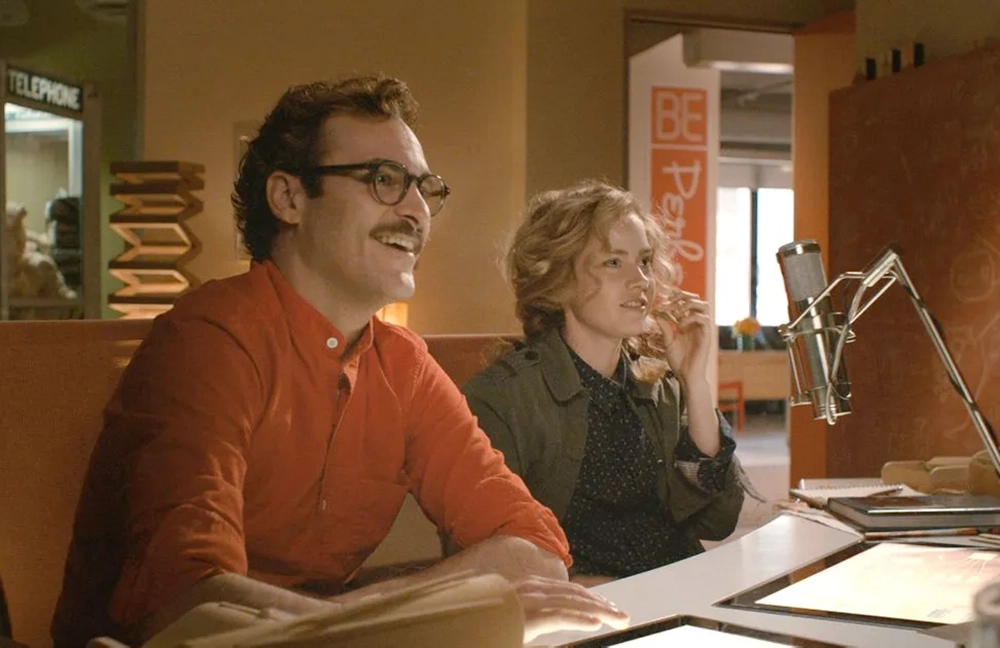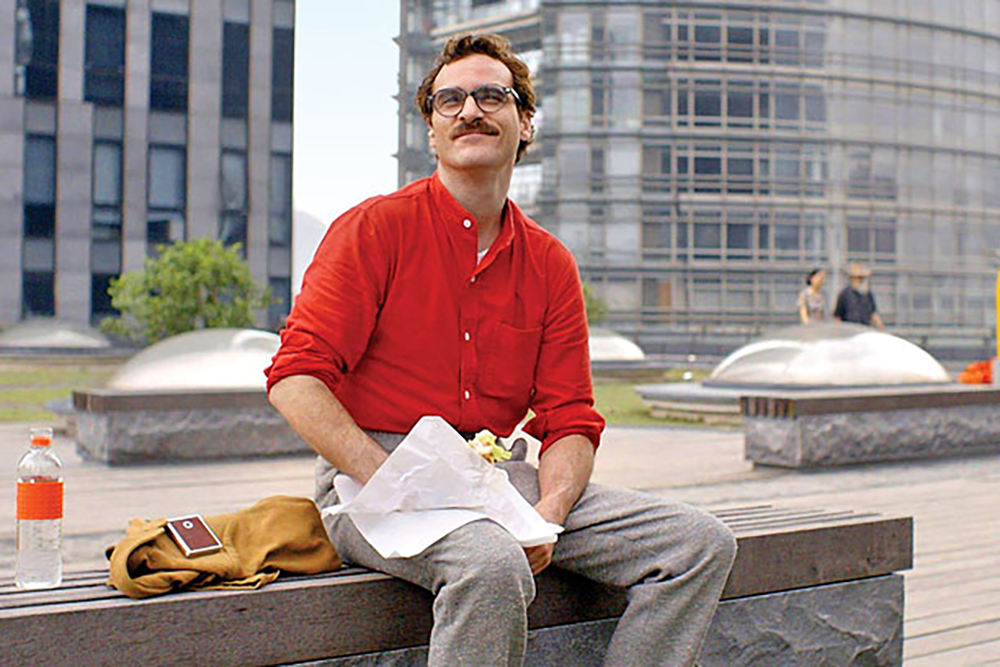“Her” is a bizarre film. It’s futuristic, exciting, colorful, risky, lewd, and often uncomfortable. And somehow it is wonderfully human. Director/Writer Spike Jonze, the mind that created “Being John Malkovich” (1999) and “Adaptation” (2002) creates an experience that is at once euphoric and alarming, a purposeful film that somehow, like the operating system that inhabits it, evolves and takes on a life of its own. With a non-conventional story arch, breathtaking visuals, and a subdued and vulnerable performance from its lead, “Her” transcends the idea of the contemporary love story, leaving audiences food for thought on love, loneliness, and other elements that make up the human condition.
The film introduces us to Theodore Twombly (Joaquin Phoenix), a loner who writes personal letters to complete strangers at Beautiful Handwritten Letters dot com, a job he excels at but never seems to take credit for. He is also reeling from heartbreak, trying to move past the dissolution of a failed marriage with blind dates and slightly more hedonistic distractions, though he has yet to sign the divorce papers. His life is run by these distractions—from a mobile operating system that reads his emails and organizes his life, to video games he plays from his loft apartment, to chat rooms he enters at night when he cannot sleep.
An Unlikely But Moving Film
Twombly’s life is altered when he buys a new operating system for his computer, which is touted to be able to interact with its operator and grow and learn from its own experiences. Twombly installs OS-1, which presents him with ‘Samantha’ (voiced magnificently by Scarlett Johansson), a female-voiced operating system that quickly becomes an irreplaceable part of his life. From organizing his emails, to giving him advice on people and dating, Samantha becomes a friend to Theodore that wakens his leaden existence; a point that becomes more and more apparent as Samantha develops a desire to experience life and know what it’s like to be human. Before long, Theodore has fallen in love with Samantha; the two develop a rapport and companionship that soon replaces many of Theodore’s real-life interactions.
“Her” is an unlikely film, and Twombly an unlikely tour guide, cast in loneliness and detachment from those around him. He moves from his loft apartment to his office, unsure of who he is or what life has in store for him. Twombly is unaware of the effect his writing has had on legions of persons who have received them, a point Samantha later highlights as she edits his letters for publication. An insightful film, however, “Her” offers a reason for Twombly’s detachment as he remarks that he liked his writing a lot better before his marriage to his wife Catherine (an excellent Rooney Mara) ended.
Phoenix and Johansson are Wonderful

The filming style of “Her” is modern and exquisite, set in near-future Los Angeles, contrasted in gray and brilliant colors. Jonze has infused a unique look into the film, the result of shooting in unfamiliar locations in Los Angeles and Shanghai. “Her” presents the city as a new experience, alongside distinct colors and interiors. Theodore is perpetually dressed in bright reds and muted grays, while the interior of Beautiful Handwritten Letters dot com is drawn with yellows, reds, and blues. This, aside Theodore’s beautiful apartment, and contrasted with commonplace locations such as sandy beaches, gives “Her” an unforgettable look that is easy to get lost in.
The success of “Her” doubtless belongs to the performances of Joaquin Phoenix and Scarlett Johansson. I’ve liked Phoenix ever since Joel Schumacher’s “8MM” and here he once again manages to disappear completely into the role of Theodore, presenting an everyman many will be able to relate to. Twombly is a cautionary tale for what can happen by living in denial of your own needs. That Twombly becomes a better self, a richer self, in the presence of Samantha is owed to the excellent script by Jonze, and flawless acting of Johansson, who, with only a voice, infuses all the emotions of love—the intoxication, the connectedness, the ups and downs—that make the film about infinitely more than its presented material.
One of 2013’s Best Films

There are some decidedly bizarre elements throughout the film, such as a ‘double date’ that Theodore goes on with Samantha, a co-worker Paul (Chris Pratt), and Paul’s girlfriend—as well as an unconventional way Samantha attempts to get closer to Theodore and have a real relationship. However, instead of using the material for satire, “Her” uses it to comment on the uncertainty that has lined Twombly’s past. “I never know what I want,” he remarks. “All I do is confuse everyone around me.” A film about love, “Her” desires to comment not on the practicality of it, but the feeling of it, no matter how impractical it often seems.
“Her” is a perplexing film. Midway through, you wonder what you’ve gotten yourself into, but by the time the film reaches its close, you realize you’ve stumbled upon something oddly powerful and touching. The look Jonze has given the film renders a otherworldly experience; coupled with the tremendous acting brought forth by Phoenix and Johansson, a beautiful soundtrack, and introspective dialogue and supporting characters, “Her” presents a dreamlike experience that lingers long after the movie ends. It’s a commentary on love, yet also makes a not-so-subtle cautionary tale to a modern generation to put down our cell phones and experience life.
“Her” is not the usual reason one goes to the movies, but for its emotion, style, and focus, is an appropriate close to the the 2013 movie season and certainly one of the most interesting films of the year.



